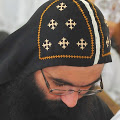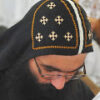“For my father Abba Shenouda of good memory whose feast we celebrate today is worthy to have his good works related, his asceticism, his way of life, his admirable virtues and the great and incredible signs, just like those of the holy prophets and the apostles of the Lord.” The life of Abba Shenouda This …
“For my father Abba Shenouda of good memory whose feast we celebrate today is worthy to have his good works related, his asceticism, his way of life, his admirable virtues and the great and incredible signs, just like those of the holy prophets and the apostles of the Lord.” The life of Abba Shenouda
This is an incredible way to start the life of a saint, as the writer Abba Wissa (St Shenouda’s disciple) already framed him as one of Bible characters. What he is trying to say is that the saint loved and lived the Bible so much that when he saw his Abba he was seeing the Bible in action.
When we on the other hand read the group of writings of St Shenouda (the canons and discourses) some of which we read during pascha week, we realise that the above image is not a bios account of the saint’s life. Reading these writings we discover that they consist of a great number of Bible references that could not be ignored. The words of the saint are so intertwined with those of the Bible that it is sometimes difficult to say where the saying of the saint ends and the Bible quote begins.
This characteristic in a saint’s life is not exclusive to St Shenouda nor is it exclusive to saints of old times or monks but it is a characteristic of all true Christians of all ages, even today. In contrast when people are asked if they read the Bible, the answer is usually “a chapter a day if any”. What we often find out is that this has been their prayer rule for years as if it was the maximum one is allowed to do. Under some circumstances it can be reduced to nothing but it would be a grave sin to read a verse more!
Fr Bishoy Kamel expressed in one of his sermons, his dislike for this ‘chapter a day’ idea that we sometimes unquestionably tie ourselves to. He advices that “we should read the Bible until we are full, as if we were eating whether it takes a verse, a chapter or maybe a book to become full, since we do not usually leave the dinner table until our stomach is full.”
We can see from the life of St Shenouda that by reading the Bible continuously St Shenouda and consequently the monks of the monastery who follow suit, were absorbed into the words of the Bible and their whole monastic experience becomes a panoramic experience of the Bible. This is also attested to in the use of the proper English word for the life of a saint which is “Hagiography.” Like many other words, it comes from Greek roots, hagios, that is holy or saint and graphe that is writing. For some medieval writers they use the same word to mean the Bible or literally “Holy Writings.”
It is related by Abba Wissa that St Shenouda was once walking with Jeremiah the prophet. Jeremiah was weeping over a brother who was reciting the book of Jeremiah without heartfelt devotion. Another time the saint was walking with the prophet Ezekiel, when the prophet stopped next to one of the brothers enjoying his fervor recitation. Abba Wissa also mentions another occasion when David the psalmist joined the brothers in singing the psalms.
In addition the language of these true Christians became verses of the Bible and when it comes to describe a person or an event, they liken it to a figure or an event of the Bible. If someone is clairvoyant and does miracles he is like one of the prophets, if someone keeps the true faith he is like the apostles, if he is a hypocrite, he is like the Pharisees, if someone happen to betray the faith he is like Judas etc.
To conclude, copies of the Bible are at our disposal and the story of the Bible is still playing now as it has been since the beginning of time, the question is which character will you play?
Join Us: Sign Up Today!
Tags:











